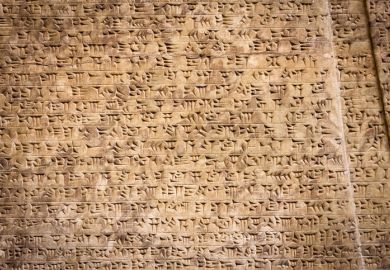Of the three books under review, Postcolonial Shakespeares is excellent. In the introduction, editors Ania Loomba and Martin Orkin introduce us to the notion of how Shakespeare was made to perform in the interest of empire to reinforce cultural and racial hierarchies and, in contrast, how Shakespeare himself may have been influenced by the beginning of empire and the mapping of new worlds.
In introducing Michael Neill's essay, the editors argue that Shakespeare's status as the most performed playwright in the world is to be attributed to imperial networks in education. I am sure this is true of India at one level; yet, having grown up there, I remember many vernacular Shakespeare productions, particularly of Hamlet , that were so loved by their audiences that the notion of Shakespeare's universal appeal cannot be denied. Indeed Loomba herself describes Othello performed in Kathakali (a dramatic south Indian dance form), which she admits "skirts all questions of histories of difference in its powerful appropriation of this story about difference".
She then says that the appropriate context for this Kathakali adaptation is "within indigenous performative and intellectual histories rather than in simply the colonial heritage of English literary texts in India". I thoroughly agree with her and Jonathan Dollimore's statement that "the disregard of intellectual history in much current postmodern theorising is one of its greatest limitations".
The essays that use the postcolonial approach together with close editorial and historical contextualising are the best. Jonathan Burton shows the instability of Renaissance notions of difference by comparing Othello to Leo Africanus's Geographical Historie . Margo Hendricks's stunning explanation of Lucrece's suicide as an avoidance of miscegenation by the fair Etruscan raped by the darker Roman Tarquin can be questioned: would Shakespeare have really known that Etruscans were fairer than Romans?
Kim Hall's work on "literary whiteness" in the sonnets drawing on Toni Morrison's definition of "whiteness" is also important in understanding the colonial encounter (though Matthew Jacobsen's new book Whiteness of Another Color challenges the notion of lumping the various ethnic groups such as the Irish and the Polish together under "whiteness"). In fact, Jerry Brotton's essay shows how the Italians were often suspect in the Renaissance, and Terence Hawkes's essay "Bryn Glas" describes the clash between Irishness, Scottishness, Welshness and Englishness in Shakespeare.
A refreshing aspect of this book, and Loomba's Colonialism/Postcolonialism , is the readiness with which she acknowledges positions opposite to hers. In the second book she starts with Russell Jacoby's now-canonised critique of postcolonialism as an obfuscating and fragmented discipline.
She defends the place of older accounts of colonialism often dismissed as untheoretical and writes that a "few essays by a handful of name brand critics have become more important than the field itself". But then she discusses just those critics: Gayatri Spivak, on whom there is an over-reliance, Edward Said, Partha Chatterjee, Arif Dirlik, Franz Fanon, Homi Bhabha and Stuart Hall (less often discussed than the others, it is true).
But it must not be forgotten that this is a book in a series "on the new critical idiom", which is supposed to provide "a handy, explanatory guide to the use (and abuse) of the term". Loomba tries her best to discuss the terminology - ideology, representation, hegemony and so on - in a language that is "user friendly"; but her circle of reference is too limited. She does not really deal with Aijaz Ahmed, who has recently questioned whether the term postcolonial is not being used too loosely, particularly when applied to the United States. I strongly believe that postcoloniality can be used metaphorically for certain attitudes and positions. Both Kipling and Paul Scott in their works can be said to have embodied a postcolonial attitude through their sympathy with India.
While Loomba does a fine job in delineating the field, there are some tendencies in Colonialism/Postcolonialism and in D. C. R. A. Goonetilleke's Salman Rushdie which bother me greatly. My first objection is to their summary nature-Goonetilleke's certainly more so than Loomba's. One cannot help wondering if students and scholars will come to rely on these summaries and not read the originals. To some extent, this is already happening, for these two authors seem to have relied only on the critical perspectives of their in-group and the reading of (or rather reading summaries of) certain works that are talked about in their circles.
Is this the result of an "apartheid" in postcolonial criticism; a genuine lack of availability of materials worldwide; or just laziness? I do not know. But I am afraid that students reading these books will take them to be the last word on Rushdie and on postcoloniality, use their bibliographies and not look at materials indexed by the Modern Language Association and other sources.
Rushdie was recently described in an Associated Press story as "the world's most visible writer in hiding". Hence the notion of describing Rushdie as being in "exile" or "self-imposed exile", as Goonetilleke calls him, seems to me absurd. Together with summaries of the novels, Goonetilleke attempts to supply the meanings behind Rushdie's wordplay and even unnecessary explanations such as translating ayah as "nanny", or providing explanations and even deconstructions of Rushdie's Urdu abuses- words like cutiya (a whole page given to explaining and describing it) and words like haramzada one would not use on the London tube, let alone on the Ayatollah.
There is a key quote from Rushdie in Goonetilleke's book that suggests why Rushdie thought he could get away with all this: "I have this accidental fair skin, speak with an English accent and don't go around in Nehru topees." This takes me back to Loomba's essay in Postcolonial Shakespeares , headed by a quote from Rushdie's The Moor's Last Sigh about "Local-manufacture-made in India-Othello fellows", a book she calls "the product of a sophisticated English-speaking intellectual's hankering after home".
Of the three books under review, Post-colonial Shakespeares shows that good postcolonial scholarship with close readings assisted by theory is possible without sprinklings of jargon and mindless repetition of theoretical mantras. It demonstrates why a proliferation of summaries is in the long run damaging to scholarship because students and scholars will pick up the jargon and run, using the summaries as short cuts without ever thinking about the original books.
Feroza Jussawalla is professor of English, University of Texas at El Paso, United States.
Postcolonial Shakespeares
Editor - Ania Loomba and Martin Orkin
ISBN - 0 415 17386 8 and 17387 6
Publisher - Routledge
Price - £35.00 and £10.99
Pages - 308
Register to continue
Why register?
- Registration is free and only takes a moment
- Once registered, you can read 3 articles a month
- Sign up for our newsletter
Subscribe
Or subscribe for unlimited access to:
- Unlimited access to news, views, insights & reviews
- Digital editions
- Digital access to THE’s university and college rankings analysis
Already registered or a current subscriber? Login



